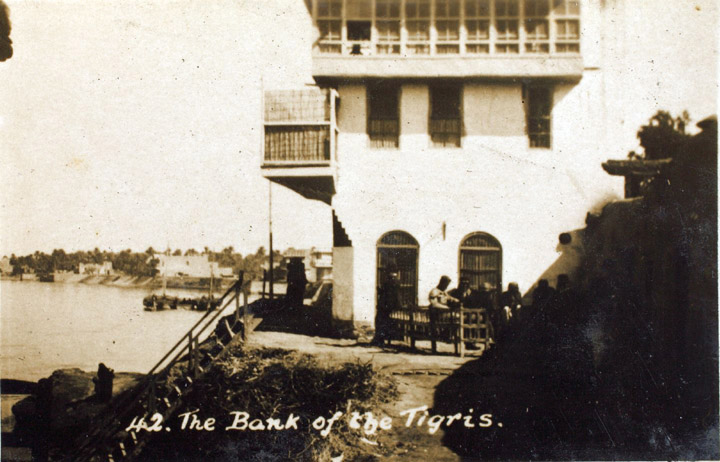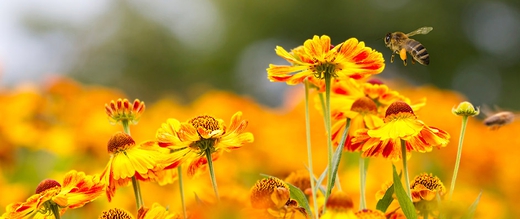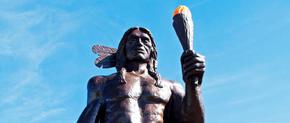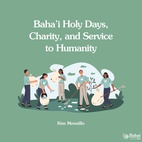The views expressed in our content reflect individual perspectives and do not represent the official views of the Baha'i Faith.
Baha’is begin observing the Festival of Ridvan, a twelve-day celebration of renewal and joy, on the 32nd day of the Baha’i year, from sunset on April 20 (marking the onset of April 21 in the Baha’i calendar) to sunset on May 2.
Baha’is and their friends celebrate the Festival of Ridvan–the most important of the five annual Baha’i Festivals—each year during this beautiful season of renewal. The other four are the Festivals of Naw-Ruz (the Baha’i New Year), the Birth of the Bab, the Birth of Baha’u’llah, and the Declaration of the Bab.
The Festival of Ridvan (which means paradise) celebrates the declaration of Baha’u’llah and the initial beginnings of the Baha’i Faith, which occurred during the twelve days of Ridvan, either on the first day or on the eighth day, according to two different accounts.
During that period in 1863, Baha’u’llah announced his station as the Messenger of God whom the Bab, his predecessor, had foretold. In other words, Baha’u’llah proclaimed that he was “Him Whom God shall make manifest.” This marks the inception of the Baha’i Faith as a distinct religion, in principle. In practice, the emergence of the Baha’i Faith as a distinct religion would be made public at a later date.
The Festival of Paradise comprises three of the Baha’i Holy Days out of the nine Holy Days during the year when Baha’is suspend their work or school and gather to mark the occasion. On the first (April 21), ninth (April 29), and twelfth (May 2) days of Ridvan, Baha’i communities unite to commemorate the signal events of that historic occasion. So let’s review what happened on the first, eighth, ninth and twelfth days of Ridvan.
The year is 1863. Baha’u’llah had lived in Baghdad from 1853 to 1863, except for his two-year departure to Kurdistan, from 1854 to 1856. Now, Baha’u’llah was about to undergo exile from Baghdad to Constantinople. But before departing for Constantinople, Baha’u’llah had an important announcement to make.

The first day of Ridvan took place on Wednesday, April 22, 1863—on a day later than the usual day that Baha’is celebrate this event. (Even though the spring equinox in 1863 astronomically occurred on March 21, yet Naw-Ruz was actually observed on March 22, because March 21 was the very last day in the Islamic fasting month of Ramadan.)
So, in the afternoon on April 22, 1863, Baha’u’llah, left his house in Baghdad, and, after being bidden farewell by an emotional throng of admirers, crossed the fast-moving Tigris River by boat.
Baha’u’llah took with him his three sons—Abdu’l-Baha (18), Mirza Mihdi (the “Purest Branch,” age 14) and Muhammad-Ali (age 10)—along with Mirza Aqa Jan, his secretary, and perhaps others. When they reached the other side of the river, the spring flood season caused the waters of the Tigris to rise. Because of that heavy river flow, the rest of Baha’u’llah’s family could not cross the Tigris to rejoin Baha’u’llah until the 9th Day of Ridvan.
A special garden, called the Garden of Najibiyyih, was reserved for Baha’u’llah and his companions, for a period of twelve days. Baha’u’llah called this the “Garden of Ridvan”—that is, the “Garden of Paradise.” Located on the east bank of the Tigris river in Baghdad, Najibiyyih was once a wooded garden, where Muhammad-Najib Pasha, the governor of Baghdad between 1842–1847, had built a palace and placed a wall around the garden. It is now the site of Baghdad Medical City, a large modern teaching hospital.
The “Festival of Paradise” commemorates Baha’u’llah’s private disclosure of his prophetic mission to a handful of his companions—around four years prior to his public proclamation to the rulers and religious leaders of the world during the 1867–1873 period. To a select few Babis, Baha’u’llah announced during his sojourn in the Garden of Paradise that he was the “Promised One” foretold by the Bab and by the founders and prophets of the world’s great Faiths.
Several years later, Baha’u’llah sent open epistles to a select group of the world’s most powerful rulers and religious leaders, proclaiming himself to be the “Promised One” foretold by the prophets of all past religions. In these “Tablets” (as the epistles were called), together with general Tablets addressed to the world’s kings and ecclesiastics collectively, Baha’u’llah stated his mission as the long-awaited “World Reformer” who came to unify the world—by a transformation that would, in the course of time, come about through the power of his universal principles and laws adapted to the needs of this day and age.
We don’t know the details of Baha’u’llah’s declaration, as Shoghi Effendi wrote:
Of the exact circumstances attending that epoch-making Declaration we, alas, are but scantily informed. The words Baha’u’llah actually uttered on that occasion, the manner of His Declaration, the reaction it produced, …the identity of those who were privileged to hear Him, are shrouded in an obscurity which future historians will find it difficult to penetrate. – God Passes By, p. 153.
We do know that on either the first day of Ridvan, or perhaps the eighth day of Ridvan, Baha’u’llah declared his mission to a few of his close companions, and the transformative global force of the Baha’i teachings began.

















Comments
Sign in or create an account
Continue with Facebookor